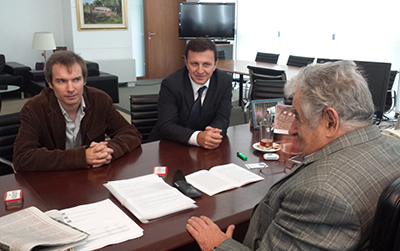“Governments pass, but laws stay,” said Uruguayan President José Mujica.
During a meeting with CPJ, and representatives from Human Rights Watch and Reporters Without Borders at the president’s executive office in Montevideo, the political capital, the former member of the leftist guerrilla group Tupamaros reflected on the upcoming congressional debate over new broadcast legislation. “It is our duty to ensure universal access to radio and television and contribute to freedom of information,” Mujica added.
The bill, which was introduced in May by the Mujica administration, is aimed at regulating radio and television with the goal of creating a diverse and competitive broadcast system. The debate on the initiative, which consists of more than 180 provisions, will start in the Chamber of Deputies–the lower chamber in Congress–this week. The legislation does not address Internet and telecommunication services.
During a two-day visit to Uruguay, where I met high-ranking government officials, legislators, members of civil society organizations, journalists, and media owners, I was able to verify that the Uruguayan bill has reasonable international standards and strong guarantees on freedom of expression.
Article 14, for instance, forbids “censorship, interferences or direct or indirect pressures on any expression, opinion or information disseminated through any audiovisual communication service.”
“The media have the right to conduct their work independently,” stipulates Article 15. “Direct or indirect pressures exerted on journalists are incompatible with freedom of expression, as is the use of the power and economic resources of the State to pressure, punish, reward or favor journalists and media because of their editorial policies,” according to the same article.
Article 16 establishes that owners of broadcast media “have the right to editorial freedom, which includes the determination and free selection of content, production and broadcasting of programming.” In yet another provision with key safeguards against censorship, Article 106 forbids “discriminatory use in the granting or renewal of licenses with the goal of exerting pressure to punish or reward journalists or media according to their news coverage or editorial policies.”
Besides strong free press guarantees and limits on excessive concentration of media ownership–both private and state–the drafting process of the Uruguayan bill has been unique. The executive branch, showing extraordinary transparency and political will, engaged every sector of society in a genuinely productive dialogue. Recommendations from journalists, media executives, civil society organizations and prominent press freedom advocates (including Frank La Rue and Catalina Botero, the special rapporteurs on freedom of expression for the United Nations and the Organization of American States, respectively) were accepted, and the original bill has undergone dozens of changes since it was first introduced in May.
One of the most important changes, on an issue of major concern to press freedom advocates, involved the composition of the regulatory body called the Audiovisual Communications Council.
In the original draft, the executive branch was responsible for selecting three of the body’s five members. The changes recently adopted give Mujica the ability to select just the president, while the other four members will be selected by the General Assembly with two thirds of the vote. This decision provides independence and autonomy for the regulator, which is key to guaranteeing transparency and preventing political interference.
During a presentation last week at the president’s executive office, OAS rapporteur Catalina Botero; José Miguel Vivanco, the executive director of Human Rights Watch’s Americas Division; and Benoit Hervieu, head of the Americas Desk at Reporters Without Borders; and I all praised the bill.
While we agreed this legislation could be a model for the region, there are a few provisions that could be improved during the legislative process. Article 27, about non-discrimination, is written in such vague and broad language that it has the potential to restrict media references to race, sex, age, cultural identity, and political ideology, among others.
Article 86, about cadenas, which are nationwide radio and television addresses by the president that pre-empt programming on all stations, imposes no time restrictions and does not specify if addresses should be limited to issues of national interest.
Another controversial aspect is related to sanctions against broadcasters who breach regulations. Changes have been made to limit the ability of the executive branch to dictate sanctions, but the current bill gives the executive the ability to suspend or revoke broadcast licenses.
In contrast to the controversial Communications Law in Ecuador, which violates international standards and represents a severe blow to free expression and democracy, this bill is a breath of fresh air. President Mujica, who spent 14 years in prison during the country’s military dictatorship in the 1970s and 80s, said that Uruguay’s bill cannot be interpreted as a gag law at all. “It will guarantee more freedom of expression to journalists but also to all Uruguayans,” Mujica said.
